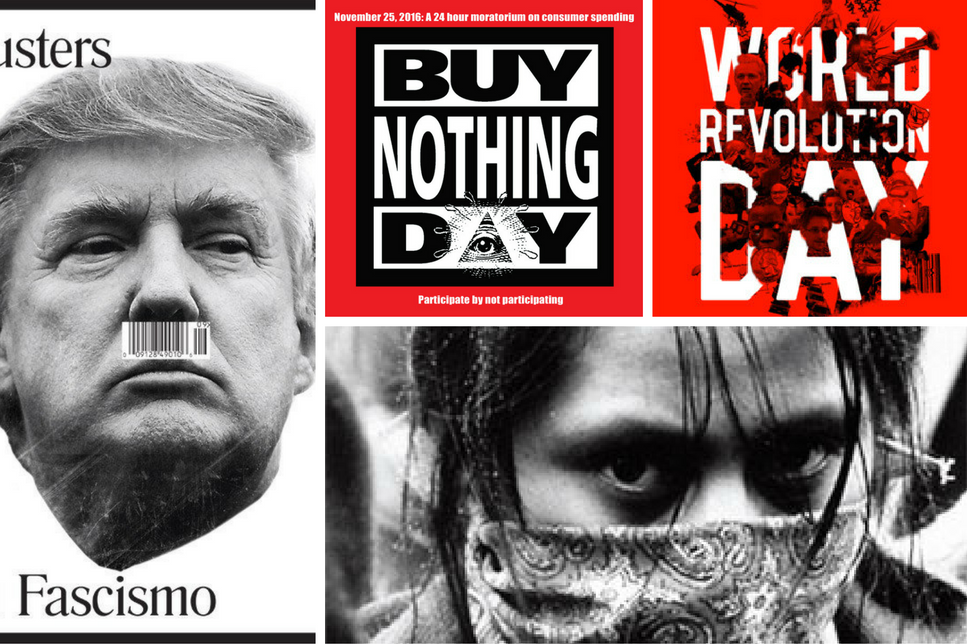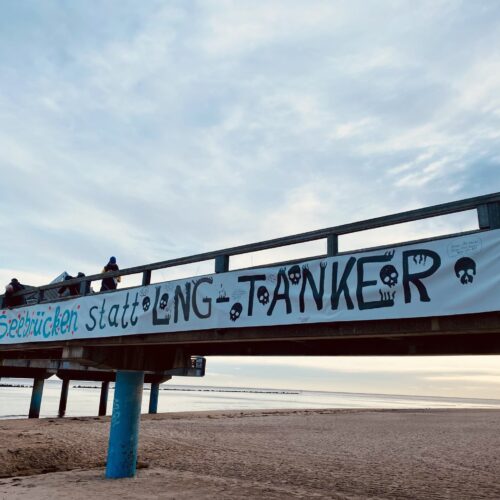Kalle Lasn and his organisation, the Adbusters Media Foundation, have been a formative connection for our funder Antonis Schwarz and the Guerrilla Foundation. In this interview he talks about global activism as the way to go, his upcoming book and lessons learned from trying to build a Billion People March in 2015.
Famous for memes like #occupywallstreet and #buynothingday, their culturejams, and the Adbusters magazine, Kalle and his team have been leading a well-designed revolution for more than 25 years to provide an alternative to the corporate-influenced mental environment we all live in. The filmmaker and author is best reached via phone at his house near Vancouver and was happy to reflect about his attempt to build a global people’s power bloc, the Billion People March, when we called him on a stormy morning in October. In true activist fashion, Kalle first off criticised my update on the Guerrilla Foundation strategic focus on making grants only in Europe. Beyond own interest, he had a broader point to make about the need for a truly global kind of activism that is worth sharing.

Romy Kraemer: How do you see the kind of global activism that you call for happening?
Kalle Lasn: We got a taste of that globalization of activism with Occupy Wall Street. But other than that it hasn’t really happened yet because, unlike corporations, we activists have been mucking about largely on the national level. Occupy was one of the first campaigns that suddenly opened people’s eyes to the fact that ‘Hey we can operate globally! We can actually launch campaigns that have activists all over the world all pushing in the same direction.’
Since then here at Adbusters we started to probe into this idea of what it would take to launch a global movement and that felt really exciting after 25 years of us working on the local and national level. To me, it felt like the future. If we’re going to stop global warming and change the rules of the global economic game, if we’re going to stop some of the rabid fascist movements on the political right, then we have to act globally.
RK: But what does it take for that, more specifically?
KL: It takes a brilliant idea! If you take climate change as an example, which is a global issue that we’re all affected by around the world, and you think about the Marrakech meeting of global leaders in November. If we could somehow mobilise millions and millions of people around the world and come up with a brilliant idea about how we should fight back and what we should demand from the leaders there instead of just leaving the negotiations to them. If we somehow had millions of people from the grassroots calling the shots from below, then that would have an impact. If people are angry enough and the news is bleak enough, then one of these days it’s going to be a global uprising, the beginning of a global solidarity around the world.
This is the cutting edge of activism right now. The idea that we, the people of the world, have to act in unison.
And now with the internet, we have the ability to launch global campaigns. Occupy and a couple of other movements have shown that we have the ability now to connect activists from all over the world, coordinating their activities around one global ‘big bang moment’ where people in cities around the world rise up and have one unified demand. Like when millions of people globally marched against the war in Iraq, even if that wasn’t successful. The internet allows us the people to come up with our own global governance system, telling our leaders directly what we want them to do.
RK: But wouldn’t that require effective and functioning global institutions?
KL: Not necessarily. And I think that if for example a billion people suddenly rose up on a single day and had a unified demand, something like a Robin Hood tax or a Carbon Tax, something that people around the world could get behind, then I think it would be impossible for the national governments to ignore. That would be the beginning of a global political force that can send a very powerful message and make it happen. So demand by demand, the people of the world would feel their muscle and realize that they can get together, focus on a single demand and push it through. That kind of global activism is the frontier for every activist in the world now.
RK: While I agree that Occupy managed to spread the idea of ‘We are the 99%.’ very quickly and people globally felt connected to this, what’s really left of that? What was the lasting effect you think Occupy has had?
KL: I think there’s two ways of looking at movements. One is where movements start working within the established system and try to change things from within, like the Teaparty movement in the US or Podemos in Spain. But Occupy Wall Street from the start wasn’t one of these movements. It was a movement of angry people from around the world who got together, started talking together, rubbed shoulders while sleeping in parks and attending general assemblies and gatherings. I think what happened there is that it politicised a whole generation in the same way like it happened in 1968.
So I think the fruits of Occupy Wall Street are softer in that there now is a more politicised young generation and a bunch of debates about what the big issues are and what should be our demands. And in instilling in people the idea that there could be a global governance system that we the people can create. If we can do that, Occupy Wall Street will be remembered as something that really changed the world.
RK: Next to a Robin Hood or Carbon tax, what are demands that people globally can get behind in your opinion?
KL: One of the meta-memes that we discuss in our book that will be a major thing for Adbusters next year is the idea that we will have total transparency in all political deliberations. The meta-meme is that ‘We the people deserve to know everything.’
It has always been taken for granted that our leaders meet in secret and come up with some TTIP agreement and that the people don’t deserve to know about this because it is too complicated or dangerous or somehow will upset the negotiations. The idea is that we’re going to pass laws that basically outlaw that secrecy that has been going on for so long. Whether on the local or national or state level if anything is kept secret it will be punished. We the people must not be kept in the dark.
If you had one billion people rising up and demanding that kind of total transparency, this is something that all people could get behind. This would completely change the way policy is conducted at all levels! This is a powerful idea that goes one step deeper than the usual stuff that the left is demanding.
The idea that we can create a political system where secrecy is taboo – this is a powerful, powerful meta-meme that we can instigate.
Wikileaks and Edward Snowden was sort of the first battle in this fight for total transparency. And you can already see the fruits of that and it is going to make people think in a different way about a whole lot of issues when they know what is going on behind the scenes.
RK: This doesn’t sound like your typical social movement organization kind of demand. How do you think funders need to change to support this type of global mobilization around these issues that you want to see?
KL: You need to go beyond the traditional leftie BS of funding organizations that are fighting the good old left fight that they have been fighting for years. Foundations like you should try to identify the most exciting intellectuals and startup groups globally to tune in to what’s exciting in global activism right now. Try to identify the catalytic people and organisations – like Adbusters!
Really do your homework and tune into what’s happening in the world of activism and then do what you did to Adbusters.
You caught us at a time when we were in a capital crunch and that funding really gave us a boost. So my advice is: zero in, do your homework, spend most of your time speaking to activists, try to be really global in what you do, identify the most powerful and catalytic people and give them a boost. Also look for organizations and people that think outside of the box and do stuff that hasn’t been done yet.
Another thing is that as a foundation you cannot bury your organizations in bureaucracy. Activist organizations are generally very annoyed at funders for making them jump through all those bureaucratic hoops. You need to keep your revolutionary fervor and don’t drown it in bureaucratic ideas. Take risky decisions and trust the organizations you support.
RK: Great advice, we’ll try our best! But speaking of risky decisions. You received funding from Antonis for the Billion People March that you had planned for December 19th 2015 which did not work out exactly as planned. Looking back, what is your explanation of events and what recommendations could you give based on this to people who might be planning similar things?
KL: There are a lot of things that didn’t work out as planned with the Billion People March. The rationale behind it was that there would be a moment of profound disillusionment after Paris (the COP 21 Meeting in 2015) which felt like the last chance for leaders to get together and do something within the existing global climate governance system. And I was betting on the fact that they would fail like they had failed many times before. But then the mood after the conference was quite positive and the reading of the agreement, also by some of the great ecological heroes of our time, was like ‘Something great happened there and this is something to build on.’ So basically, that moment of disillusionment never happened. Therefore people weren’t motivated to go out to the streets in great numbers. So that was the main thing. We were betting on failure and there had been a partial success. Even though I think that it’s going to be a long term failure.
But then, also, during Occupy Wall Street, Adbusters was sort of the catalyst. We came up with the posters and the hashtags and spoke to people on the street to fire them up and sent them boxes of Adbuster issues and so on. But when we did the Billion People March, we were trying to lead people and telling people what to do instead of just catalyzing their energy.
This is one of the biggest mistakes that you can make when planning a campaign: to tell people what to do.
There was also something about our website and the messages that we sent out that was off stylistically. There was something not quite right and so we weren’t able to fire up the imagination of people.
But there were many great ideas in there and we’re building on that now with the website Billionpeoplemarch.org and we’re zeroing in on these big systemic meta-memes with our future Adbusters issues and a forthcoming book. So on that failure we’re building the next big step.
RK: So do you believe that this anger after a failed agreement is needed to mobilize people? Do you feel there is any other emotion based on which you could build a global movement?
KL: Well… my own feeling is that it’s much more courage rather than anger that is needed. Getting away from that thinking small and muddling around that we on the left often do. The real angry people, I feel, are on the far right. We on the left are just lacking the courage to match them.
I think the more important factor is the ideas that are there. The left has been tweaking things within the system. Like protesting against a pipeline. So you go there and you protest and you get arrested and maybe you even stop the pipeline. But then, three months later, there is another pipeline! And if we stop that another one. So what happens is that we exhaust ourselves on stopping a pipeline but we don’t stop the system that produces these pipelines. So what we really have to do and what I hope to do with Adbusters over the next years is to change the system. Go as deep as you can to make sure that you stop the pipelines from happening. What sort of a global system and power structure do we need so that this doesn’t happen? Instead of operating within the system and fighting what’s coming up, can we proactively build another power from below that is outside of it?
RK: Thanks, Kalle, for this inspiring interview!



